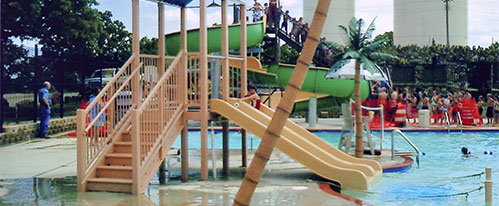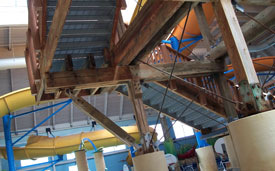Corrosion Resistant Material for Recreational Water
Humanity has been enjoying recreational water and leisure facilities for millennia. The world’s first swimming pool was dug as early as 3,000 BC, and various ancient cultures subsequently adopted the tradition of building public facilities for bathing and exercise. It is an unshakeable custom that millions of people worldwide still regularly partake in. However, modern technology has made swimming baths and pools almost unrecognizable from their earliest roots. Swimming conditions, in fact, are barely comparable to those from just a few decades ago. Novel filtration systems, advanced chemical cleaning processes, and corrosion resistant materials have enhanced our experience of recreational water facilities in terms of security, hygiene, and enjoyment.

This blog post will explore the potential benefits of fiberglass as a corrosion resistant material for swimming pools and water parks.
Fiberglass: Comprehensive Corrosion Resistant Material
Corrosion is a costly factor in many industrial and commercial sectors, particularly in water-based leisure facilities where components are almost constantly subjected to a flow of water. Pool systems also routinely circulate potent cleaning agents designed to disinfect pool water and break down retained organic matter. Ladders, handrails, and stairs must, therefore, exhibit good resistance to water and harsh chemicals, as well as a range of biological compounds.
Fiberglass is a unique corrosion resistant material that can be tailored to resist specific corrosive agents for extended periods. These characteristics are determined by the components used to fabricate the composite material. This typically includes strands of glass along with a custom polymeric resin. Structural shapes may also include an enhanced surfacing veil to resist glass corrosion.
 Pool water is typically maintained at a balanced pH 7 up to a maximum pH 8. This can be enough to reduce the resistant surface characteristics of stainless steel products to cause localized pitting or stress corrosion cracking (SCC). SCC is made more likely in recreational applications given the volume of pedestrian traffic, which introduces an additional element of mechanical stress. Stairs and handrails manufactured from metals are incapable of meeting modern safety and security demands due to the risk of mechanical failure associated with chlorine-corrosion. Given its hygroscopic nature, wood is similarly unsuitable for applications where it will inevitably begin to rot over time.
Pool water is typically maintained at a balanced pH 7 up to a maximum pH 8. This can be enough to reduce the resistant surface characteristics of stainless steel products to cause localized pitting or stress corrosion cracking (SCC). SCC is made more likely in recreational applications given the volume of pedestrian traffic, which introduces an additional element of mechanical stress. Stairs and handrails manufactured from metals are incapable of meeting modern safety and security demands due to the risk of mechanical failure associated with chlorine-corrosion. Given its hygroscopic nature, wood is similarly unsuitable for applications where it will inevitably begin to rot over time.
Fiberglass is a corrosion resistant material that operates at a higher mechanical standard for much longer. It does not provide superficial resistance to chlorinated pool water but comprehensive, long-lasting performance in demanding recreational water applications. It neither rusts nor rots and has found pervasive use in leisure facilities for both structural and aesthetic reasons.
Corrosion Resistant Materials from Strongwell
Strongwell has supplied an array of corrosion resistant materials for recreational water applications, including stair treads, handrails, structural shapes and plates, and poolside grating. These components are inherently resistant to corrosion via water and obligatory cleaning agents, providing long-lasting performance that conforms to all necessary regulations.
If you would like to contact us about formulating bespoke corrosion resistant materials for a demanding application, please do not hesitate to contact us.